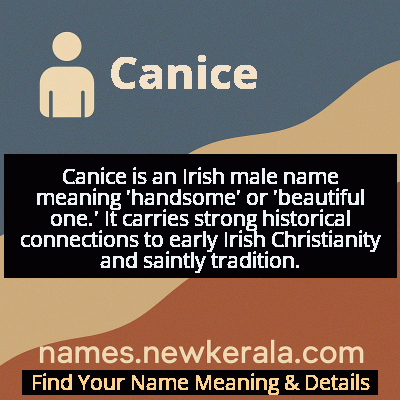Canice Name Meaning & Details
Origin, Popularity, Numerology Analysis & Name Meaning of Canice
Discover the origin, meaning, and cultural significance of the name CANICE. Delve into its historical roots and explore the lasting impact it has had on communities and traditions.
Name
Canice
Gender
Male
Origin
Irish
Lucky Number
8
Meaning of the Name - Canice
Canice is an Irish male name meaning 'handsome' or 'beautiful one.' It carries strong historical connections to early Irish Christianity and saintly tradition.
Canice - Complete Numerology Analysis
Your Numerology Number
Based on Pythagorean Numerology System
Ruling Planet
Saturn
Positive Nature
Ambitious, efficient, realistic, and authoritative.
Negative Traits
Materialistic, stressed, confrontational, and can be overly ambitious.
Lucky Colours
Dark blue, black.
Lucky Days
Saturday.
Lucky Stones
Blue sapphire, amethyst.
Harmony Numbers
2, 4, 6.
Best Suited Professions
Business leaders, managers, financial services, law enforcement.
What People Like About You
Leadership, determination, organizational skills.
Famous People Named Canice
Saint Canice
Irish abbot and missionary
Founded monastic settlements including Aghaboe and Kilkenny, patron saint of Kilkenny
Canice O'Mahony
Irish poet and writer
Noted for contributions to modern Irish literature and Gaelic revival movement
Canice Mooney
Irish historian
Specialized in medieval Irish church history and hagiography
Name Variations & International Equivalents
Click on blue names to explore their detailed meanings. Gray names with will be available soon.
Cultural & Historical Significance
The name carries strong associations with Irish monastic tradition, scholarship, and the spread of Christianity throughout the Celtic world. Kilkenny, the city named after his church, remains one of Ireland's most important medieval urban centers, ensuring the saint's legacy endures in Irish cultural memory. The name represents a connection to Ireland's golden age of saints and scholars, when Irish missionaries and educators played crucial roles in preserving classical learning and spreading Christianity throughout Europe. This historical significance gives the name Canice a weight of cultural heritage that transcends mere personal identification.
Extended Personality Analysis
Individuals named Canice are often perceived as possessing a quiet dignity and intellectual depth, reflecting the name's scholarly and spiritual heritage. They tend to be thoughtful, analytical, and principled, with a strong sense of tradition and moral conviction. The name's meaning of 'handsome' often translates to an inner beauty and grace rather than merely physical appearance, suggesting someone who carries themselves with elegance and composure. Canices are typically reliable, steadfast friends and colleagues who value deep, meaningful connections over superficial relationships.
They often exhibit leadership qualities that are more subtle and contemplative than overtly charismatic, preferring to lead through wisdom and example rather than force of personality. Their connection to the name's monastic origins may manifest as a love of learning, quiet reflection, and a tendency toward introspection and spiritual curiosity. While they can be reserved in large groups, those who know them well appreciate their dry wit, loyalty, and the depth of their character. The combination of the name's meaning and historical associations suggests someone who balances aesthetic appreciation with intellectual rigor and ethical consistency.
Modern Usage & Popularity
Canice remains a relatively rare but cherished name in modern Ireland, primarily used in families with strong connections to Irish heritage or Catholic tradition. While not among the most popular contemporary Irish names, it maintains a steady presence, particularly in regions with historical ties to Saint Canice such as Kilkenny and surrounding areas. The name has seen occasional revivals among parents seeking distinctive yet historically significant Irish names that haven't been overused. Outside Ireland, Canice is occasionally used in Irish diaspora communities, particularly in the United States, Canada, and Australia, where it serves as a marker of cultural identity. Its rarity in modern times gives it an air of distinction and traditional authenticity that appeals to parents looking for names with deep historical roots but contemporary uniqueness. The name's usage patterns reflect a broader trend of rediscovering and preserving traditional Irish names that were once more common but fell out of fashion during periods of Anglicization.
Symbolic & Spiritual Meanings
Symbolically, Canice represents the intersection of physical beauty and spiritual depth, embodying the Celtic ideal of inner and outer harmony. The name carries connotations of wisdom, learning, and spiritual guidance, reflecting its association with monastic scholarship and saintly virtue. It symbolizes the enduring power of tradition and cultural memory, connecting modern bearers to Ireland's rich early Christian heritage. Canice also represents quiet strength and steadfastness - the ability to maintain one's principles and composure even in challenging circumstances. The name evokes images of ancient stone churches, illuminated manuscripts, and the peaceful contemplation of monastic life, suggesting a personality that values reflection, knowledge, and spiritual growth over material concerns or fleeting trends. In a broader sense, Canice symbolizes the preservation of cultural identity through naming traditions and the way personal names can carry centuries of history and meaning forward into contemporary life.

